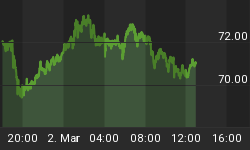Billionaire hedge fund manager, David Tepper, made news this week when he emphatically stated that investors have nothing at all to fear regarding the eventual tapering off of Fed's $85 billion worth of monthly debt monetization. His assertions were based on the fact that our annual deficit is shrinking and would thus require less of Bernanke's money printing.
Besides the fact that the deficit for fiscal 2013 will still be about $500 billion higher than it was before the Great Recession began at the end of 2007, markets have two other reasons to fear the cessation of quantitative easing. What Mr. Tepper doesn't realize is the end of QE will cause the U.S. dollar and interest rates to soar. And that will have devastating consequences for the markets and economy in the short term.
Since February of this year, the dollar has increased by 6.3% against our six largest trading partners. Just imagine how it would then surge if the Fed were to start aggressively reducing its bond-buying program...especially in light of the surging debt monetization now occurring over in Japan and the protracted recession in Europe. Of course, a stronger dollar would be greatly beneficial to the American economy in the long term, as it engendered a period of deflation that is needed to reconcile the current imbalances of debt, money supply and asset prices. However, that same deflation would likewise do significant damage to equity prices; as it also vastly lowered the revenue and earnings of S&P 500 corporations.
But the most important problem if Bernanke were to taper QE this summer and bring it completely to a halt by the end of this year, is that the market would then begin to factor in the unwinding of the Fed's near $3.5 trillion balance sheet. This would, at the very least, cause interest rates to rise back towards the forty-year average of about 7% on the Ten-Year Note. Interest rates have already been around zero percent for nearly five years. The condition of artificially produced low rate for years on end causes the economy to become addicted to cheap money. Misallocations of capital and economic imbalances occur; like bubbles in equities, real estate and bonds.
In 2007 the real estate bubble popped once the cost of borrowing money to purchase over-priced homes became unaffordable. This caused banks to become insolvent because their assets were primarily involved with real estate loans. Insolvent banks and over-leveraged consumers sent the economy into a depression. Today, banks and consumers have deleveraged on the margin, but the government has vastly increased its borrowing. At the start of the Great Recession, we had $48.8 trillion in total debt and our GDP was $14.2 trillion (343% debt to GDP). At the end of Q4 2012, the U.S. economy had $53.8 trillion in total debt sitting on top of a $15.8 trillion economy. The current debt to GDP ratio is 340%.
Therefore, we can be sure rising interest rates will bring down the economy this time just as it did six years ago because the total debt to GDP ratio at the start of the Great Recession is exactly the same as it is today. The only difference is the interest rate attached to that debt has been artificially reduced to the low single digits. When rates rise, as they will if the Fed aggressively tapers QE, the government will then learn it does not have the tax base to service its debt.
This is why every time the Fed threatens to end QE the markets tumble and why Tepper, and investors, should fear the eventual taper. Evidence of this fear is abundantly clear. On February 20th the minutes of the January FOMC meeting were released, which indicated members of the Fed were growing concerned about the amount of asset purchases. That very same day the NASDAQ dropped 1.5% and commodity prices tumbled.
In addition, stock market gains appear to have decoupled from market fundamentals and are merely clinging to the hope of endless Fed credit creation. This week's economic data was profoundly anemic, yet markets still rallied. On Wednesday news came out that Industrial Production dropped 0.5% in April, and the Empire State Manufacturing Index fell to a minus 1.4 in May, from a positive 3.1 in April. Also on Wednesday, we learned that France entered into a double-dip recession and Europe's recession extended into its sixth straight quarter. Nevertheless, the S&P 500 gained 0.5% that day.
The following day's economic data was just as bad. On Thursday we learned that the Philly Fed Survey dropped to a minus 5.2 in May, from a positive 1.3 in April, and Initial Unemployment Claims surged 32k for the week ending May 11th. However, the S&P 500 spent most of the day on Thursday in positive territory; until 2:30pm. That's when San Francisco Fed President John Williams said in a speech, "We could reduce somewhat the pace of our securities purchases, perhaps as early as this summer, and end the program late this year." The market cared nothing about the current weak economic data but was very much concerned about the threat to end QE. The S&P quickly sold off 0.5% once news broke that the Fed may begin slowing its asset purchases.
The truth is rising debt service payments on government debt will wreak havoc on the economy just as it did for real estate and banks back in 2007. Artificially-produced low interest rates, record amounts of debt and inflation targets set by central banks make for a very dangerous cocktail. An expeditious tapering on the part of the Fed from QE may be the prudent and necessary thing to do for the long-term health of the country, but it would also send markets and the economy into a cathartic depression in the interim.
















